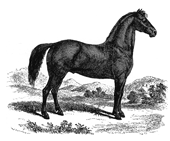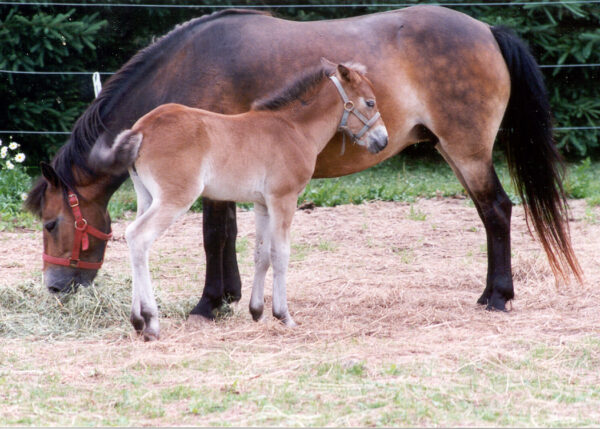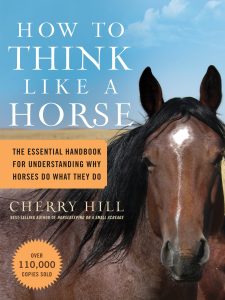
Breed Facts
Status:
Critical
Use:
Riding, Driving, Control invasive plants
Adult Weight:
800-900 lbs.
Adult Height:
11.1-12.3 hands
Temperament:
Docile, Spirited
Experience Level:
Novice
Notes:
Athletic; intelligent; native grazers that thrive in the wild; double-layer winter coat; used to increase native plant diversity; most primitive of English breeds
EXMOOR
Exmoor, are one of a group of five native, regionally-adapted English ponies that also includes the Dales, Dartmoor, Fell, and New Forest. The Exmoor is native to the hill country of Exmoor, a wide expanse of moorland bisected by the River Exe located in southwestern England. Ponies first came to the British Isles over 100,000 years ago and Exmoor ponies closely resemble the drawings found in caves in France and other European countries. Early Stone Age settlers hunted them for food – as did local, pre-historic predators. When the English Channel formed, the British Isles became isolated from mainland Europe, and as farmers settled and developed the lowlands, the British Hill ponies became isolated from one another, eventually becoming the different breeds known today. Most of the ponies were mixed to create distinctive breeds, but the Exmoor was different. Due to its isolation, the original type of pony survived and is genetically distant from the other breeds. It is interesting to note that the earliest written record of the breed was found in the 1086 Domesday book.
Until the early 19th century, most of the open areas of Exmoor were designated a
“Royal Forest” (with Forest meaning hunting preserve). The Crown’s overseer (“Warden”) managed Exmoor and the wild Exmoor ponies that ran free there. When the Royal Forest was sold to industrialist John Knight in 1818, he decided to “improve” Exmoor, including the ponies. Fortunately, the outgoing warden, Sir Thomas Acland, took 30 of the native Exmoor ponies that had lived in the forest to his own estate; some local farmers also bought ponies sold at a dispersal sale and began their own herds where they bred the original type ponies. Knight and a few others produced cross-bred ponies, but they were not able to survive living out in Exmoor’s harsh winters. The last of these “improved” herds died out in the 20th century. The descendants of the Acland Exmoor pony herd survive as the “Anchor” herd of Winsford Hill, as do those of the other farm families who continue to breed pure Exmoors.
Ponies were registered through the National Pony Society through the 1800s until the Exmoor Pony Society was begun by Exmoor farmers in 1921 to preserve the purebred ponies.
The breed was almost lost during World War II when they were used for training troops – some for target practice – or were stolen and transported to be used as food in cities ravaged by the war. By the end of the war, only around 50 Exmoor ponies survived. Exmoor native Mary Etherington encouraged farmers to restart breeding to rebuild the herds. Cattle grids allowed stock to be returned to the moors to graze and slowly the British population began to recover. In the UK, several county wildlife trusts have established small, free-roaming herds on select nature reserves to help manage the vegetation, allowing for the conservation of the ponies as well as their habitats. Exmoor ponies were first exported to North America in the 1950s.
Natural selection has shaped the characteristics of the Exmoor, and their coat is unlike that found in any other breed. Its winter coat has two layers: an insulating undercoat and an outer coat of greasy, coarse hair that is almost waterproof. This insulation is so effective that snow will collect on the ponies’ coats – referred to as “snow thatching” – because not enough heat is being lost to melt it. The body hair grows in patterns that facilitate the shedding of water, and the plentiful mane, tail, and forelock protect delicate parts of the body. The Exmoor has a very large nasal cavity, giving space to warm cold winter air, and a raised rim around the eye protects it against water and debris. The ponies’ uniform brown coat – from bay to dun with black points – is adaptive as camouflage; white marks are not allowed on ponies that are registered. A lighter brown (“mealy”) is found on the muzzle, around the eyes, and on the flanks.
Exmoor ponies stand 11.1–12.3 hands at the withers and are very stocky for their height. They average 800-900 lbs. The deep girth and chest make for a large digestive capacity, important for using a large amount of rough forage in their diet. The breed has found a conservation niche as their dental construction allows them to be very “neat” grazers who can eat what other animals won’t, thus allowing the increase of plant diversity.
The ponies are athletic, intelligent, and can be strong-willed. They are often used as childrens’ ponies. Although the numbers of Exmoor ponies have increased, they are still considered endangered in both their home country and internationally.
Did you know:
The Livestock Conservancy is America’s leading organization working to save over 190 heritage breeds from extinction. We rely on the support of our members, grants, and donations from the public to raise the $1 million needed each year to maintain our conservation work with rare breeds of farm animals. Click here to learn how you can help.
You may be interested in…
Managing Breeds for a Secure Future
By Dr. Phil Sponenberg, Dr. Alison Martin, Jeannette Beranger
$34.95
Manual of Methods for Preservation of Valuable Equine Genetics
By Kindra Rader, Charles C. Love, Charlene R. Couch and Katrin Hinrichs
$19.95

Breed Facts
Status:
Critical
Use:
Riding, Driving, Plant control
Adult Weight:
500 lbs
Temperament:
Docile, Spirited
Experience Level:
Novice
Notes:
Athletic,, intelligent, native grazers thrive in wild, double layer winter coat, used to increase plant diversity, most primitive of English breeds
You may be interested in…
Managing Breeds for a Secure Future
By Dr. Phil Sponenberg, Dr. Alison Martin, Jeannette Beranger
$34.95
Manual of Methods for Preservation of Valuable Equine Genetics
By Kindra Rader, Charles C. Love, Charlene R. Couch and Katrin Hinrichs
$19.95






